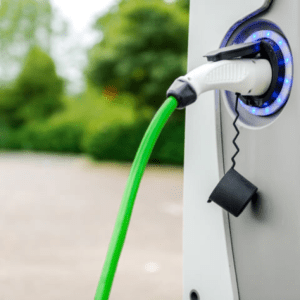The electric car is seen as the solution to achieving a cleaner and greener automotive world; less pollution and less noise. This sounds like a plan and many more people are taking up the option of driving electric. If there is one small ray of light from the recent and ongoing horror of COVID-19 it is that, by having to stay home and not use our fossil-fuelled cars, the atmosphere in urban and suburban environments improved considerably. The air is cleaner and palpably so. This has been remarked upon and has encouraged drivers to think about taking up the EV option in the future. That means the future of electric motoring looks bright.
Charging Issues
Electric vehicles do not necessarily suit everybody though, as much as they might like to own one. Folk who live in flats where their designated parking space is some distance away for example and homes where there is no driveway or hard-standing available adjacent to the building; what are the charging options for them?
Of course, there may be public charging points nearby or an enlightened employer might allow charging at the workplace, but running a charging cable to a car at some distance presents a problem. Some motorists have tried to get around this by trying new, home-made solutions in an effort to circumvent the cable-length issue. Here’s why they should not be doing this:
Charging Cable Length
Most new EV’s come with a bog-standard charging cable with a three-pin plug at the end; this has become known as the ‘granny’ cable. It’s a safe, if slow, basic item but long-term or continual use is not recommended as the technology evolves. Most owners now choose to buy a new ev charging cable with a Type 1 or Type 2 connector which they sensibly combine with a smart home charging station conveniently installed on the driveway or in the garage.
A difficulty can arise sometimes in that the siting of the charging point on a vehicle may not always be conveniently placed. Similarly, after a change of EV, a previously well-sited point may be less handy for connection. The solution is to buy a longer cable; EV Cable Shop offer 20 metres charging cables which should be sufficient for most needs.
Daisy-Chaining EV Charging Cable
Rather than buying a new cable, some owners have taken to using domestic extension cables to lengthen the granny cable supplied. This is dangerous. It may be okay to run an extension to drive a power tool or an electric mower but these leads are not designed to carry the maximum current required for EV charging.
It is possible to buy more robust electric extension cables but these must be heavy-duty and weather-proof. Further, they should have a RCD, (residual current device) fitted in-line. This is a life-saving device which is designed to give users a level of personal protection that ordinary fuses and circuit-breakers cannot provide. In an emergency, a granny cable could be attached to one of these to give added length, but again, this is not a desirable or long-term solution.
Instead some EV drivers have tried to link, or ‘daisy-chain’ the granny cable with a Type 2 cable, to effectively double the length; it doesn’t work. The ‘female’ connector contains signal pins that send data to the car during charging. These are recessed and, because the ‘male’ end of the other cable doesn’t fit fully, a full link is not made. The result is that no current is carried through the connection even if live. An important message here should be that to tamper in any way with EV charging cables or equipment without specialist knowledge is to risk potentially expensive damage to the car’s charging system and of course risk to life and limb.
To summarise then, owners should consider their circumstances carefully when looking at EV options. Is it feasible to charge an EV adjacent to the home? Where is the connector sited on the vehicle? Will the cable reach? In most cases these issues can be resolved by buying a longer ev charging cable from a trusted supplier who can offer advice. Charging an electric vehicle is perfectly safe, rain or shine; tampering or experimenting with electrical equipment is not.





